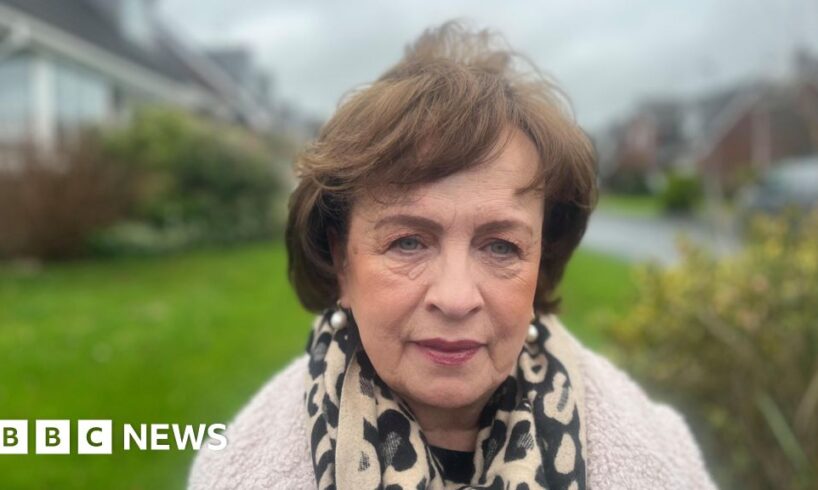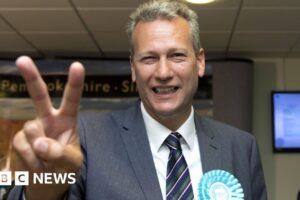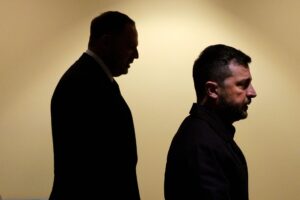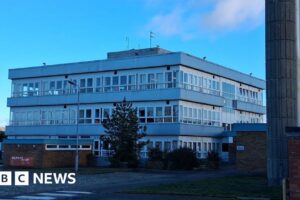
BBC
Diane Dodds says most decisions were taken “without any controversy”
A Democratic Unionist Party (DUP) MLA has defended the executive’s handling of the Covid-19 pandemic saying the “vast majority” of decisions were taken “without any controversy or any real issues whatsoever”.
Diane Dodds, who was economy minister for a period during the pandemic, was responding to the latest report by the UK Covid-19 Inquiry.
The UK Covid-19 Inquiry found that decision making in Northern Ireland “was chaotic, and infected by political machination”.
Chair Baroness Heather Hallett said “insufficient attention” was given to the prospect of a second wave of the virus, with only limited contingency planning in place for reintroducing restrictions.
Pacemaker
Baroness Hallett said the relationships between ministers were “poor” and “detrimental to good decision making”.
She added that “on multiple occasions” decision making was “marred by political disputes between DUP and Sinn Féin ministers”.
However, Dodds told the BBC’s The View programme: “We operate in a mandatory coalition in Northern Ireland, that means we have parties with differing views on many subjects.”
She added that, if a pandemic were to re-occur, the executive should make sure that “we are well prepared, have a considered response, and there should be a contingency plan that is fully operational and able to be stood up at very short notice”.
“We need to acknowledge that covid was an incredibly terrible time for everyone in Northern Ireland,” she continued. “We need to take time to look at the report, soak up the details, and then to respond.”
PACEMAKER/Press Eye
Then First Minister Arlene Foster and Deputy First Minister Michelle O’Neill pictured at a press conference on the 20 March 2020 shortly before lockdown in Stormont Castle, Belfast in relation to Covid-19
The Ulster Unionist Party (UUP) MLA, Robin Swann, was health minister at the time of the pandemic.
In a statement, a spokesperson for the UUP said he “acted on the best scientific advice available” and that “his guiding light at all times was keeping the public safe”.
“We were deeply dismayed by the lack of seriousness shown by some executive colleagues during this critical period, including persistent briefing against others and the leaking of confidential information.”
They added that the report’s findings on Sinn Féin members attending the funeral of Bobby Storey were “significant” and that the decision to attend “seriously undermined public trust”.
“It is also clear that DUP colleagues were largely driven by political opportunism and sought to create division within the executive rather than focus on the collective challenge,” they said.
Dodds responded to the criticism from the UUP on BBC One’s The View, saying: “Pot, kettle, and black comes to mind.”
“This is an opportunity that Robin Swann and the Ulster Unionists have taken to have a swipe at the DUP,” she said, adding that there are “many issues that could be held against whoever within the executive.
“Our thoughts should be with those who still grieve.”
Northern Ireland First Minister Michelle O’Neill said the report is a “welcome milestone in the long journey of recovery after the pain and trauma” of the pandemic.
“Covid was an unprecedented global emergency and this report will provide further lessons from the experience at all levels of society,” the Sinn Féin deputy leader added.
“Those lessons must inform our preparedness for, and response to, any future pandemic or society-wide emergency in the future,” she said.
Sinn Féin North Antrim MLA Phillip McGuigan said in all instances the party “tried to follow the medical advice”
Sinn Féin North Antrim MLA and party spokesperson for health Philip McGuigan told The View: “I don’t think any administration anywhere in the world wouldn’t be facing criticism of how they handled particular scenarios.”
“I think from Sinn Féin’s perspective and I wasn’t on the Executive. In all instances we tried to follow the medical advice which is important that we did.”
Traditional Unionist Voice (TUV) leader Jim Allister called the executive “dysfunctional as ever”, adding that “even for covid” ministers “couldn’t get it together”.
A spokesperson for The Executive Office said the report is a “significant milestone”, and that “there are lessons to be learned and the cross-departmental group established to take forward recommendations continues to meet and will now consider today’s findings”.
Dr Alan Stout said the report was “not surprising”
Dr Alan Stout, chair of the British Medical Association (BMA) in Northern Ireland, said the report is “not surprising and it’s also not good reading”.
“The first wave, the initial stages, the report covers this quite well. We were very, very dependent on the UK response and we very much followed the UK response,” he told BBC Radio Ulster’s Good Morning Ulster programme.
“And actually, Northern Ireland probably performed slightly better.”
“But it was that second wave, and that’s where that word chaotic comes in,” Dr Stout added.
He said it will be “massively disappointing” and “hugely ironic” if the report is used “as an excuse for political parties just to take a pop at each other again, this is about proper learning”.
What are the report’s recommendations?
The report gives a long list of suggestions, including 19 specific recommendations for Northern Ireland, to avoid “a potential vacuum of decision-making powers”.
They include:
Reconstructing the role of chief medical officer for Northern Ireland as an independent advisory role.A review into how powers are delegated in government during an emergency.Amending the ministerial code to prohibit the disclosure of individual views expressed during meetings of the Northern Ireland Executive Committee.Establishing structures to improve communication between England, Scotland, Wales, and Northern Ireland during an emergency.
Baroness Hallett said the recommendations should be acted upon and implemented in a “timely manner” to better protect the people of Northern Ireland.
“Unless lessons are learned, and fundamental change is implemented in Northern Ireland, the human and financial cost and sacrifice of the Covid-19 pandemic will have been in vain.”
Need to be ‘more cooperative’
Former chief nursing officer in Northern Ireland Professor Martin Bradley said there is “nothing very new in all of this”.
Speaking to BBC Radio Ulster’s Good Morning Ulster programme, Mr Bradley said: “I think that it wasn’t our finest hour as far as politics was concerned.
“And we do need, if we are going to learn any lessons, we need to actually be more cooperative with each other, and we need to have more empathy with each other; understanding that if you rub people’s noses in it from a political point of view then you’re not going to get anywhere.”





